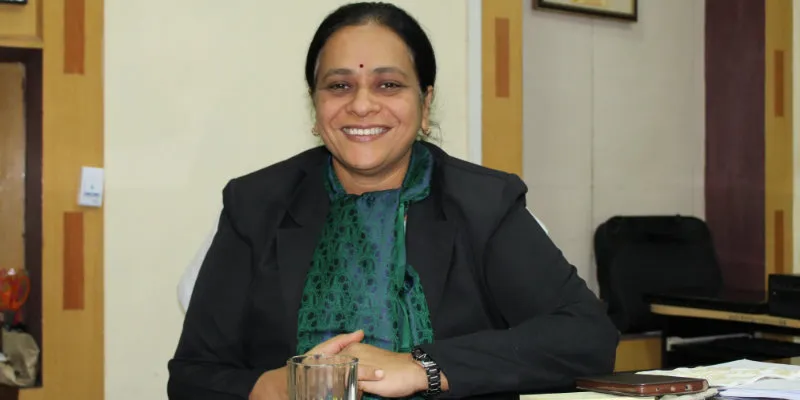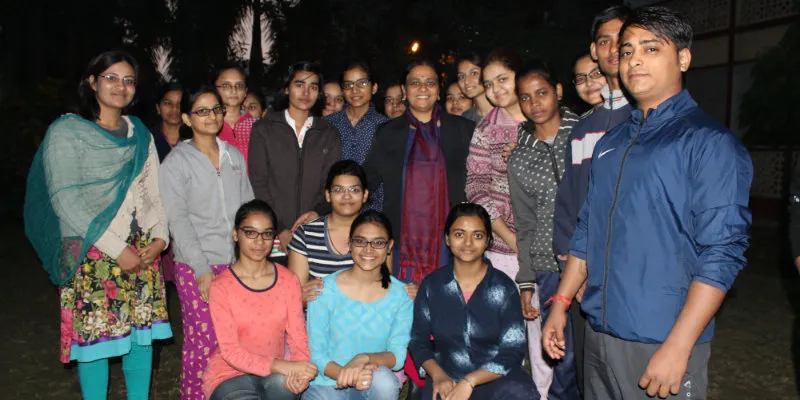Meet Royana Singh, the first woman chief proctor of the 101-year-old BHU
Royana Singh, who took charge at BHU after violence erupted on campus following an incident of molestation, believes that hard work and sincerity can give genius a tough fight.
Royana Singh rose from the blaze of one of the most violent crackdowns on student protests in recent times to create history in a university over a century old.

That it should take a woman born in France in 1972, and named after the seaside town (Royan) where her parents were working then to do so, should be incredulous to some, but not to Singh, whose guiding principle in life is that hard work with sincerity trumps everything else.
“Genius will find its place. But sincerity gives even an average person the chance to challenge genius,” she explains.
When she was first summoned by the then VC of the Banaras Hindu University (BHU), where Singh had been serving in the Department of Anatomy since 2007 (she is now a professor), her question to him was, “Do you have faith in me?”
Never one to doubt her abilities, Royana knew that the circumstances of her appointment were less than pleasant. On the night of September 24 this year, there was a police lathi-charge on students, including girls, demanding better on campus security. While the brutality was shocking in itself, the fact that it happened in the Prime Minister’s constituency some hours after his visit left the nation aghast.
In the aftermath, Chief Proctor ON Singh resigned, and Royana was appointed to the post four days after the violence. The 31 chief proctors before her had all had been men.
Her appointment was considered by some as an image-building exercise for the university and a watershed by others, but Singh’s analysis is rather cautious.
“Because of the culture of patriarchy, we could never think of a woman holding the highest administrative position. With more education and awareness, this transition was bound to come and I am part of that stream,” she says.
Influenced by her mother
Royana's mother, Chandra Prabha (now 77), a tissue culturist, has been one of the strongest influences on her.
“She would drum it into our heads that hard work always paid, and kept us from household chores so that we could devote our time to studies,” Royana says. The “we” includes her younger sister Bandana, who passed away in 1994, three years after they lost their father Indra Sen, a geneticist.
This double loss, at a time when Royana was pursuing her MBBS at Guwahati Medical College, did not dim her determination to stay at the top of class. A year later, she married Shiv Prakash, a fellow doctor pursuing his Internship. She was then 23 years old.
To Royana, the transition to marriage was natural and did not warrant questions.
“I had seen women in my family balance marriage and work. It (marriage) would not deter my career in any way. I had seen my mother work hard and manage the home. It was a given that that is how it would be with me,” she remembers.
Two years later, when Royana was doing her internship, her first child, Pranav, was born. A daughter, Saumya, came two years later. Child rearing made her take a two-year break from work. But as soon as her children were old enough to be left in a creche, Royana started working as a medical officer in a government hospital.
In 2001, she enrolled for a post-graduate course in anatomy at BHU. From 2004 onwards, she spent three years working at various hospitals around the state while her husband had a private practice in Varanasi. The children stayed with their father as the grandparents could help take care of them.
Changing track to do more
By 2007, somewhat tired of her weekly to and fro, Royana told her husband of her desire to stay in Varanasi.
“I offered to join his private practice,” she says. His response, however, was in keeping with the understanding she had come to expect of him. “He said you have sacrificed enough (in reference to the two-year break). Why don't you work on your career? You have as much right as me,” she recalls.
Royana then joined the BHU as a lecturer and went on to pursue her PhD. Years later, she’s the university’s first woman chief proctor.
Her day now starts at 4.30 am, with her cooking breakfast for her school-going daughter. Her husband, a general surgeon, joins her to cook lunch (she thinks he is a far better cook), which she then carries with her to the office at 8 am. Her day is a whirlwind: listening to student complaints, making random checks across the campus (often patrolling on a cycle), meetings with members of the proctorial board, and four hours of teaching and research (on muscular dystrophy and neurological disorders).
There are no defined end-of-office hours and she’s sometimes in her office till 2.30 am. Her phone could be ringing till much after that.
“I was always a workaholic and have passed that to my team,” she says.
Keeping the channels of communication open

Ensuring discipline and the security of the 32,000 students of BHU could be viewed as a daunting task. But not by Royana.
Five days after taking charge, she was confronted by a group of students poised to burn her effigy. Ignoring her security personnel who pleaded with her to stay away, she walked right into the crowd.
“I am here, why don’t you burn me?” she said, her heart “pounding” but her voice unwavering. The sheepish students did go ahead with the effigy burning but had a conversation with Royana about their grievances.
Her interactions are marked by a polite firmness. Be it a male student accusing a female of abusing him or a distraught student reporting a lost mobile phone, she neither raises her voice nor loses her slight smile. The student protest that thrust her into her current role has taught her a valuable lesson.
“Many small grievances accumulate to reach a point of no return and then vested interests manipulate them. Thus, immediately giving students the opportunity to vent is important, even though redress might take longer,” she says of the attitude the proctorial board (now enlarged to include more women) has adopted under her.
Spotted in beautifully coordinated silk stoles, Royana says she’s the “get up and get going kind”. Her few moments of free time are devoted to music. “Soft English romantic numbers are my favourites,” she says, adding that Clean Bandit, Ed Sheeran, and Taylor Swift figure on her playlist.
Royana is committed to turning the BHU into a more gender-sensitive and secure university. As a start, she has involved student volunteers for patrolling duties and placed barriers across the campus to impede entry of outsiders after 6 pm.
She is a firm believer that one’s gender is not an impediment if one is good at work. Throughout her academic and professional life, she has been complimented for being better than her peers.
“My mother's guidance that one should completely dedicate oneself to the task at hand has always stayed with me,” she says.
However, more than any other factor, Royana attributes her success to her husband. “Both of us sacrificed some, compromised some. That is how a family runs, that is how societies run,” she says.
She hopes this very give and take will soon help heal the fractured relationship between the university administration and students.







